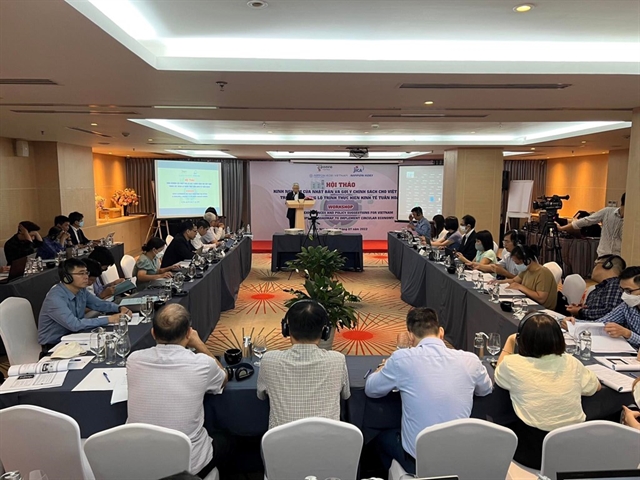 Environment
Environment


|
| Vietnamese and Japanese experts share experiences at the workshop on “Japan's experience and policy suggestions for Việt Nam in developing a roadmap to implement circular economy.” — VNA/VNS Photo |
HÀ NỘI — Shifting to a circular economy requires the government and stakeholders to make collective efforts, according to an experience-sharing workshop on the circular economy.
The Japan International Cooperation Agency (JICA), in cooperation with the Institute of Policy and Strategy in Natural Resources and Environment (ISPONRE) under the Ministry of Natural Resources and Environment of Viet Nam (MONRE), on Wednesday organised the workshop on “Japan's experience and policy suggestions for Việt Nam in developing a roadmap to implement circular economy.”
The circular economy is a systematic solution that can tackle global crises such as climate change, plastic waste, and environmental pollution. Moreover, under the impact of the COVID-19 pandemic, a circular economy would be a powerful instrument for the economy and society to realise a green recovery.
To develop a rigorous policy framework for transforming the current linear economy into a circular economy after the new law on environmental protection came into effect in January 2022 with the Government of Việt Nam issued Decree No.08, which sets out specific regulations on the implementation of circular economy and formulation of the National Action Plan on circular economy.
Speaking at the workshop, JICA Deputy Representative in Việt Nam Murooka Naomichi said that a circular economy was defined by a circularity of economy in which we shift from the linear economic model of “take-make-dispose” to a circle that focuses on reuse-remanufacture-recycle to keep products as long as possible in the circle and gives back as much as possible the material we used.
"In Japan, traditionally we have the spirit of “Mottainai” which means 'waste not, want not,' and it was embraced in the Government of Japan’s Basic Act on Establishing a Sound Material-Cycle Society enacted in 2000," he said.
"Like Việt Nam these days, we were facing pressing problems of increasing waste and limited land for waste treatment facilities. The law dictates a move away from mass production, mass consumption and mass disposal and also guides the development of laws for individual waste and recycling."
In 1999, with difficulty in the treatment of industrial waste and the challenge of efficient use of natural resources, Japan’s Ministry of Economy, Trade and Industry (METI) created the Circular Economy Vision as one of the first commitments around the world to reduce industrial waste and limit the use of natural resources. Based on this vision, Japan made significant improvements in promoting extended producer responsibility (EPR), increasing the recycling rate and expanding environment-related businesses.
To further push for a circular economy in Japan, the Circular Economy Vision was updated in 2020 to encourage transformation to a virtuous cycle of environment and economic growth, especially against the climate crisis.
"Transition to a circular economy has a long way to go, and the Government should take a step-by-step approach with a transparent monitoring and evaluation system to encourage the private sector to bring in their innovative business models," Naomichi said.
Lại Văn Mạnh, head of the Department of Natural Resources and Environment Economics under the ISPONRE, said that Article 142 in the Việt Nam's Law on Environmental Protection defined circular economy as an economic model which encompasses the design, production, consumption and services activities aimed at reducing raw materials, extending product life, reducing waste generation and minimising adverse impacts on the environment.
The Government decree No 08/2022/NĐ-CP on the elaboration of several articles of the law also has general provisions on circular economy.
Accordingly, general criteria for developing a circular economy include the reduced exploitation and use of non-renewable resources and water resources; increased efficiency in the use of resources, raw materials and materials; extended life of materials/equipment/products/goods, reduced waste and improved waste treatment, Mạnh said.
Ministries and agencies then would develop sectoral-specific criteria, he added.
It was expected that the MONRE would submit to the Prime Minister a proposed national action plan on cicular economy by the end of next year, Mạnh said.
He said that the ministry also planned to build and operate a platform for connecting information and sharing data on the application of the circular economic model.
Ministries and localities would formulate issue-specific action plans for implementing the circular economy.
"Ministries and localities incorporate specific criteria for implementation of a circular economy, organising pilot application in energy, fuel and waste industries," he said, adding that they were also to manage and update information and data on circular economy models and integrate with the MONRE's information system.
Regarding the involvement of enterprises in developing a circular economy, Mạnh suggested furthering engagement with environmentally-friendly transportation solutions, solar energy, rainwater collection and storage, and recovery and reuse of treated wastewater.
Adachi Ichiro, JICA’s Environmental Management Advisor, explained the history of circular economy policy development and the traditional spirit of “Mottainai,” which embraced the concept of circular economy in Japan.
The experiences of Japan in developing the circular economy policy framework, which centres on the concept of a Sound Material-Cycle Society in 1999 and the circular economy vision 2020, proved that it was necessary to involve all stakeholders, including the private sector, to select priority sectors to be included in the action plan, Adachi said.
Other experts said that participation at the grassroots level, including consumers and households, played an important role in developing circular economic models and that once they had a proper understanding and benefits, such models would generate positive results. — VNS




